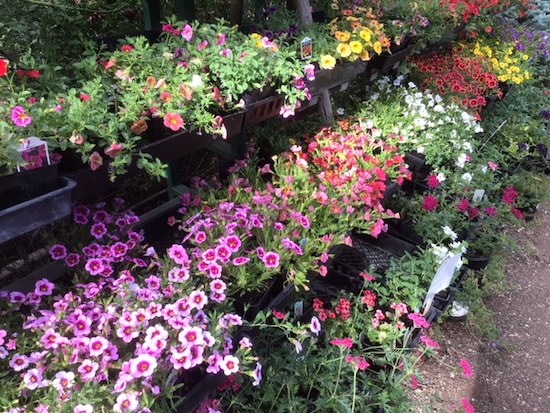
These beautiful callies are a dollar off.
So what is with our whacky weather??? Wind, humidity, showers, snow, hail, heat, and cold all played a part in May. Add to that our coldest nights in several years in spring, and we are not the only ones confused. Pretty sure our plants do not know what is going on either. I believe they are under some duress. I have never had so many issues with fungus here that I can remember. Peach Leaf Curl was not an issue, but Fireblight on the pears is. Fireblight can attack apples, pears, cotoneaster, and pyracantha, to name a few. It is so-called because the leaves and branches blacken like someone took a torch to them. No cure, though; a copper spray can help. Remove the diseased growth 6 inches into healthy wood, sterilize your pruners after each cut and get that diseased wood off your property ASAP.
Roses and other plants full of powdery mildew? Join the crowd. We can not get rid of it this year. Normally, we do not have that problem like in more humid parts of the country, but this year the roses have been treated with several rounds of fungicide, including baking soda, sulfur, copper, neem, and Revitalize. The last one is a Bacillus Bio-Fungicide. It is a different variety than your yogurt but still pretty benign. Jason, the Star Roses rep, was just here and said his father taught him to use milk, and I have heard that it works. He swears by it. It is unknown why it works, but it is believed to be something in milk solids. He said it takes care of Downy Mildew too. He uses skim milk, and I think he said 4 parts milk to 5 parts water. Might want to look up more info. I believe I am going to try it.
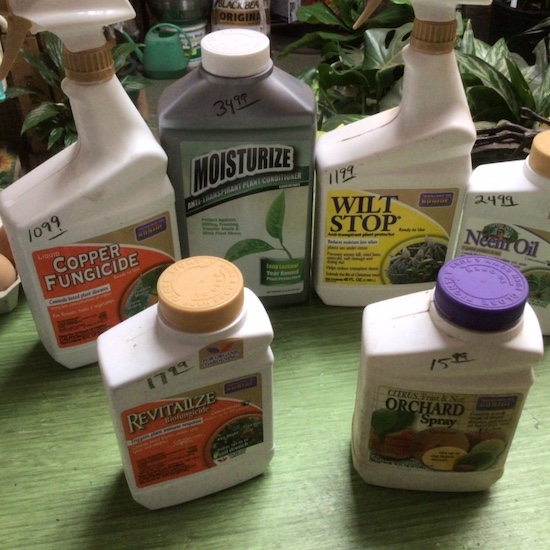
Fungicides and anti-transpirant
I have been keeping an eye on the dying plants at the park. First, I thought water or too much dog urine when the first shrub began to die. It has quickly spread through the park plantings, and I was at a loss. I had never seen anything like it in all my years doing landscape maintenance and nursery work. It has been diagnosed by one of our sales reps as crown rot. The water mold Phytophthora causes this. The same genus that causes Sudden Oak Death. It gets into the plant and clogs the vascular system so it can not take up water. The plant withers and dies. Again I will say that the weather has played a part. I believe the plants are stressed from the inconsistent climate we are now having, which makes them more at risk.
We have had a few calls about no fruit on the tree this year, and what is the problem? Whacky weather! Warm, dry, and sunny all winter, causing too early of a bloom on our fruit trees. My stone fruit trees were hit by the hard freeze at full bloom. Bees don’t do too well in rainy, cold, or windy weather. Our commercial growers had a lot of loss too. It will mean higher food costs. “When it rains, it pours.”
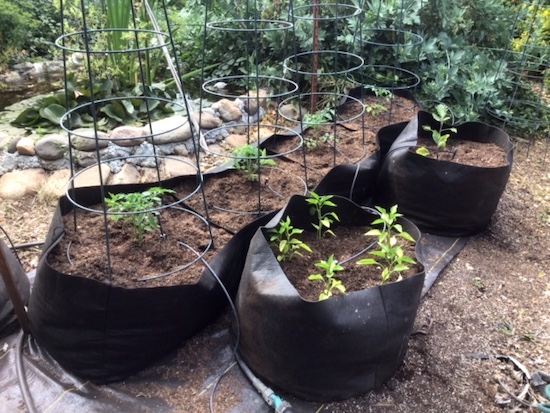
Just planted my garden using Smart Pot Long Bed
Are you too late to plant a summer vegetable garden? Heck no. We still have a good selection of tomatoes, peppers, winter squash (i.e., butternut and acorn), summer squash (i.e., zucchini), cucumbers, melons, and pumpkins. FYI winter squash is planted now and is called that because it stores well for winter consumption, not because you grow it in winter. Keep an eye out for critter damage. Missing large parts of your plant means a mammal of some kind like dear, rabbits, squirrels, or gophers. Fencing and gopher wire are your best bets to control those, although there are safe repellants you can use. Less major damage is earwigs (they come out at night and love basil), slugs, beetles, caterpillars, etc. Organic Bt is best for caterpillars like the little worms that eat your geranium and petunia buds. For slugs, snails, and earwigs, we recommend Sluggo Plus non-toxic bait. For all else, OMRI approved neem, pyrethrum, spinosad, and herbal sprays can be used. Remember that these sprays are not selective and to avoid using them when beneficials are active.
Time to get that moisture holding and weed preventing thick mulch layer down on your plants. We sell barks and GreenAll Firmulch, but straw works great in a large vegetable garden. You can get that at Rainbow. Cedar bark has the added benefit of being a deterrent to some bugs and slugs. Firmulch not only helps with moisture retention but also adds nutrition to the soil and looks great as a top dressing. It is also a soil conditioner to add when planting trees, shrubs, and perennials. We are putting it on sale for June, so there is no excuse not to get some. We guarantee you will like this product. It is also important to water your plants properly to develop deep roots. This will make them more drought-tolerant in the long run. Less frequent, deep watering is key.

Great color for shade or part sun
Citrus availability is hit and miss. Demand is high, and crops have been selling out before the next one is ready. We were able to get another batch of Cerinthe. Many of you were asking about the succulently blue and purple blooming plant we had in a pot here, and I thought we would not be able to get more until fall. We have lots of ‘high’ summer-blooming perennials in stock now, like coreopsis, black-eyed susans, and echinaceas. Some of the best heat and sun-tolerant plants for color are scaevolas, lantana, and portulaca. These are annuals here, but they sure give you bang for your buck. We just put out some of our portulaca baskets that perform well where other plants suffer in the heat. They are just starting to bloom. A few of you have asked about annual vinca, but I have not seen it available yet. This is one of the most colorful heat and deer resistant annuals I know of that pretty much performs all summer into fall. We will get them in as soon as we can. The roses are looking good despite the issues. I am getting ready to place the Bare root orders for them for 2023, so if you have some special requests, get them to us now. Same for fruit trees. Already planning for next year!
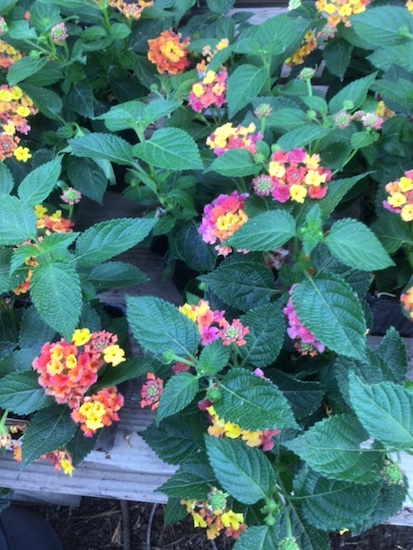
Lantana is a dollar off.
June Specials
- GreenAll Firmulch: $2.00 Off
- Lantana: $1.00 Off
- Calibrachoas: $1.00 Off
- Raspberry flavored Strawberries: $2.00 Off
- Roses: Buy 2, 3rd Half Off
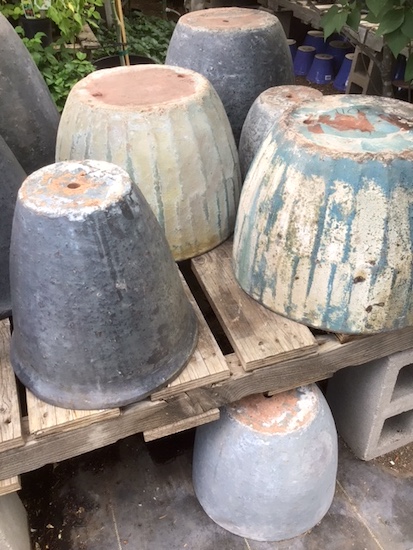
New Antique finish pots